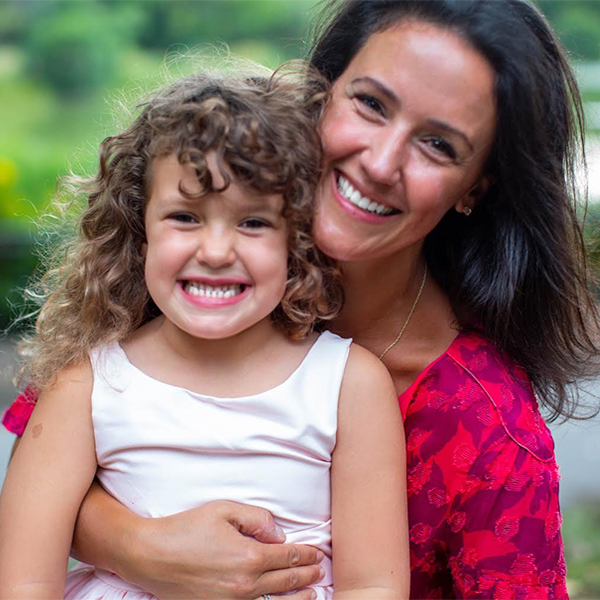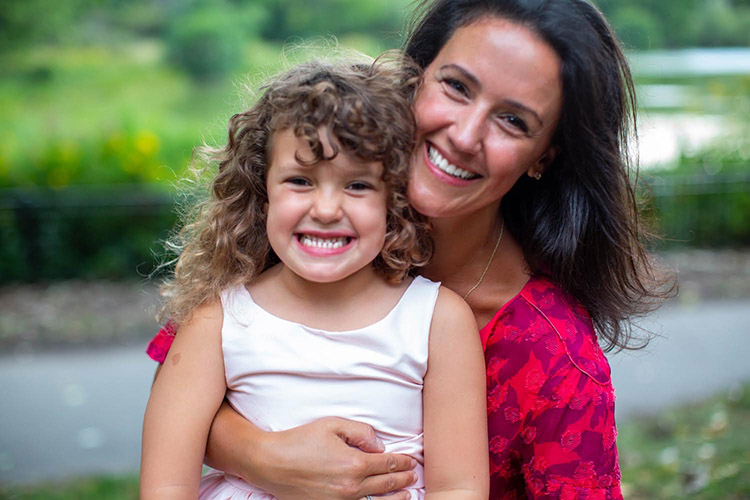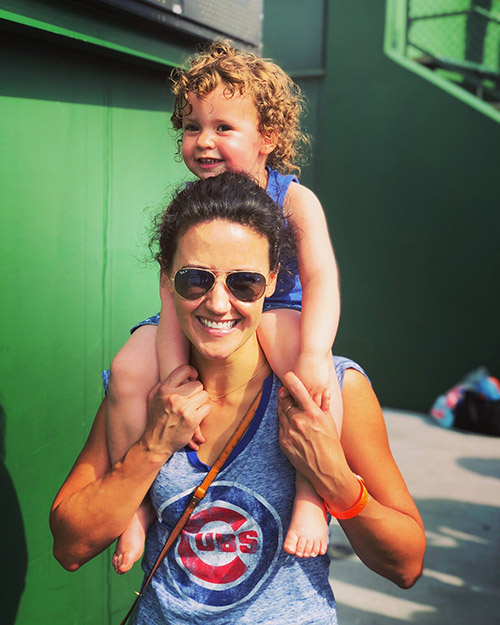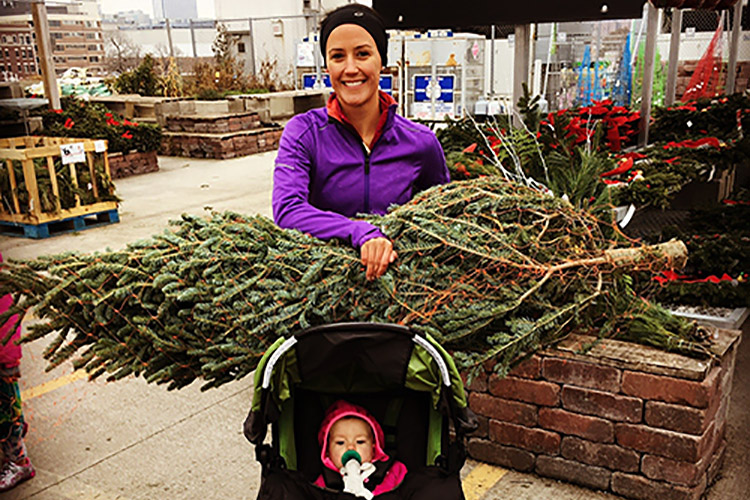My name is Allison Stockwell. I have one daughter, Alexandra, who is four and a half, will be five December 26th. And we live in Lincoln Park.
I grew up in the east coast, just outside of New Haven, Connecticut, and my town was very blue collar, very mixed. A lot of everybody. And very diverse culturally, racially, and I grew up without hearing a lot of prejudice even if it was anywhere around me, or racism just because the town was so... The schools I went to were very mixed. I realized how fortunate I am to have been raised in that environment. I've lived in New York City, and I came out to Chicago in 2007 for work, and was married and divorced and then actually had my daughter when I was 35, sort of a happy accident but with another partner who is not here. He lives in Europe, so it's just her and me. I am a solo single parent. No shared custody. My entire family's back east in Connecticut and New York, and when I was pregnant I realized I had to decide where I wanted to be and what I wanted my life to look like, and moving back to New York where I had family would be great, but Chicago really started to feel like home. As one of my dear friends said, there's a tremendous amount of civic pride here. It's a nice little melting pot. Most people aren't from here directly, so you've got a lot of transients and a lot of people that are here because they want to be.
And I always joke with the people that are in our coastal offices that everyone thinks Chicago is just cornfields and winter and murder. It's not very well represented, and I love how undersold and underrated it is. Because it keeps it affordable. I love that I can spend as much or as little money as I want. That there's more affordable housing here. I'm comparing it to New York City. There's grass and this wonderful lake and a lot of things to do. As a single parent, there was no way I would've been able to either afford... I wouldn't have been able to survive without living in a major city where I could get formula or diapers delivered within a couple of hours and not have to leave the house because I can't take a newborn with me. She was sick one night, three months old and I was alone, and I would have Pedialyte Amazon Now'd to my house. But there are very few cities that that exists in. I have a car, but it's preferable to not have to use it, and not have to deal with it. Chicago had everything I needed, plus I have a wonderful, very flexible job where I've been given a lot of autonomy. Chicago's really won me over as a place to raise my daughter.
We went to South Carolina. We were down in South Carolina when George Floyd was murdered, and that one actually really got me. That was so upsetting and so hard to explain to her, but you don't know how much is too much information. Which I still don't have any concept of. You don't know if you're exposing them to the unnecessary but it was still important for me to explain to her why I was upset, what was happening. Then the protests and the rioting happened, and we discussed that as the violence. She saw the fires on TV and I realized that, not less is more, but I'm going to give her the one word answers, so the violence is what it turned into. I introduced information bit by bit, his name. If you ask her, she knows exactly who it is. She knows exactly what happened, she knows that he was mistreated by a police officer. It's also hard not to denigrate civil servants, social servants, and people like police men who kids are taught to revere and look fondly on and rely on for safety and security. It's also a challenging conversation to make sure that she's getting all angles of that.
She knows. It's just like in school. There's always somebody that isn't doing the right thing, but most people are good, and most people care. So we talked about what that means in small bits and bite sizes. I say the word racism, and I more use the term being anti-racist, and anti-racism. She doesn't quite get what it means, and I sort of don't want to call attention to it. It was never anything I understood as a kid. Two of my best friends growing up, who I spent most of my time with, were black. But that was never a... I would've never used that to describe them, and kids don't think that way. When she talks about her Asian friend, she doesn't refer to her as her Asian friend, it's the friend with the long black hair, so I kind of like to keep that vocabulary out of it.
When we talk about racism, it's people who are different or have been treated differently by society, and that seems to get the point across. I do obviously say Black, she understands the difference between Black and White, but again the concept of racism is so fraught that it's... I bought a couple of books. We've got a few children's books that were written, their names are escaping me, but they're talking a lot about it in her school, which I appreciate. There's not a single parent that has a problem with that. I guess that it's still, it's ongoing. And even with the most recent riots and looting, she asked me if something else had happened to somebody else. Or is this like what happened with George Floyd? I said no. How do you explain that this was coordinated chaos, and that these two things really have nothing in common. It's hard to say whether they do or don't. Being able to look at the TV and say very honestly "This is what happens when a group of people is mistreated or told that they're not important enough, or they're not getting the help that they need."
And again, she's only four and a half, but she does... Those things make sense to her. Kids are much smarter than we give them credit for, which I've always known, but I think having these conversations with her has really driven that home. We don't go too deep, don't do too much at once, and she doesn't need to watch the news. I don't even watch the news. I can't. It's too much. But having that has been a really important learning aid, and it has mad me very very grateful for my family and the way that I was raised, because these are things that I didn't have to learn. They were just a part of the way I was raised and my family. A lot of people have to struggle, and they don't get to learn these things until they're much older. I hope that she either thinks that these are just instilled in her long before now, and that they carry with her through adulthood, and that she is an active supporter of this movement, and that she is a lifelong anti-racist. I can't imagine a scenario where she wouldn't be, but I guess never say never.
But she'll be raised with a value system to know that not only is this not okay, but you stand up when you see something that's wrong. You say something. You are a friend, you're an ally, you're a supporter, and there's no excuse, no excuse to be quiet. I'm not a quiet person. I'm not one to sit by. And I think a lot of it is a lack of exposure, a lack of education. My ex husband was raised in a very far northern town in Minnesota, outside of Duluth, and I think he'd met one Black person in his life before he went to college. There's nothing wrong with that per say, but it obviously changes... If you hear people speaking, spouting racist rhetoric, or any kind of hateful rhetoric, and you don't have anything to combat that, you don't have any role models or adults or education system that directly provides evidence that this is wrong, that that is a stereotype, that we don't speak this way, et cetera. Then, I don't know. It's all by learning. It's all by what you see around you.
Here, I think the worst part is the segregation just begets more segregation and ends up emphasizing a lot of the stereotypes since the poor are becoming poorer and the police system being overwhelmed, and that's no one group of people's fault, but when people become fearful, they become hateful. They're terrified, I think the people that spout most of this stuff are just absolutely terrified. Candidly, a lot of Trump's supporters. The stuff that they spout is largely based on a total fear, fear of perceived loss of control, or fear of the unknown. Fear that someone is going to somehow take something away from them. None of it is rational. And fear is one of the hardest emotions... I don't know how you overcome it if you don't want to. And if you can find that echo team, or anywhere on the news and the internet, you can always turn to a channel that's going to support whatever philosophy you have. I have no idea how to do it on a widespread basis, but I know that raising kids that don't think that way, and even getting the education into the systems of the kids on the south side and some of the poorer neighborhoods, that not all white people should feel a certain way about you. Or that they need to know that they're valued and good and equal, and that they have opportunities.




